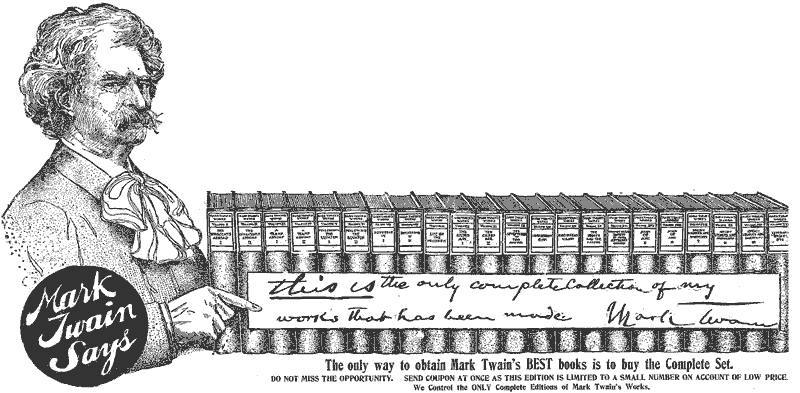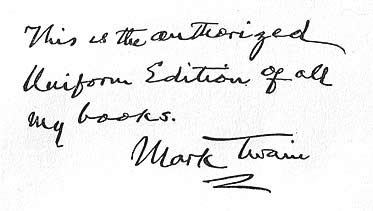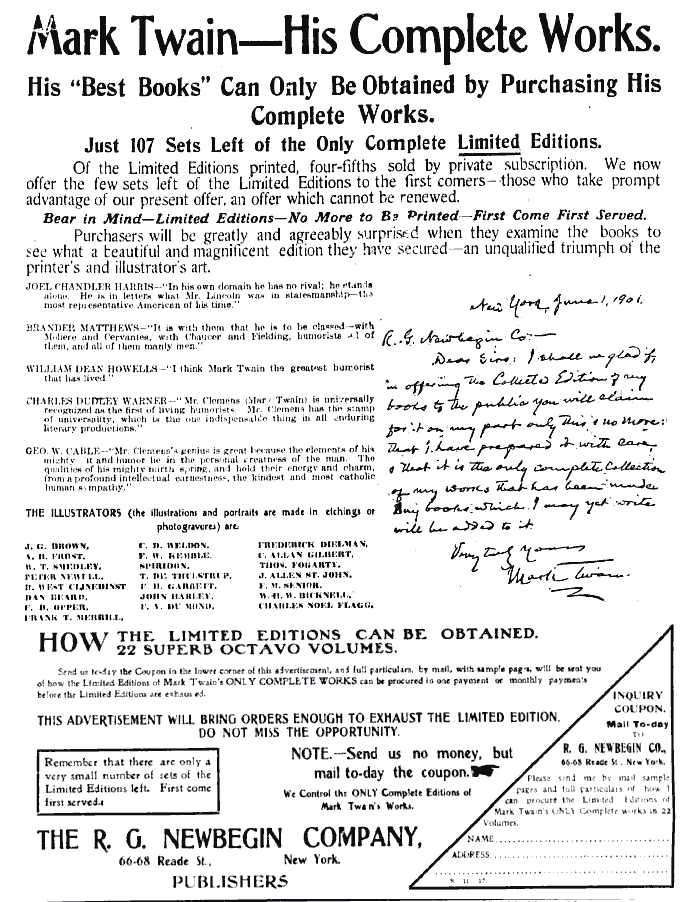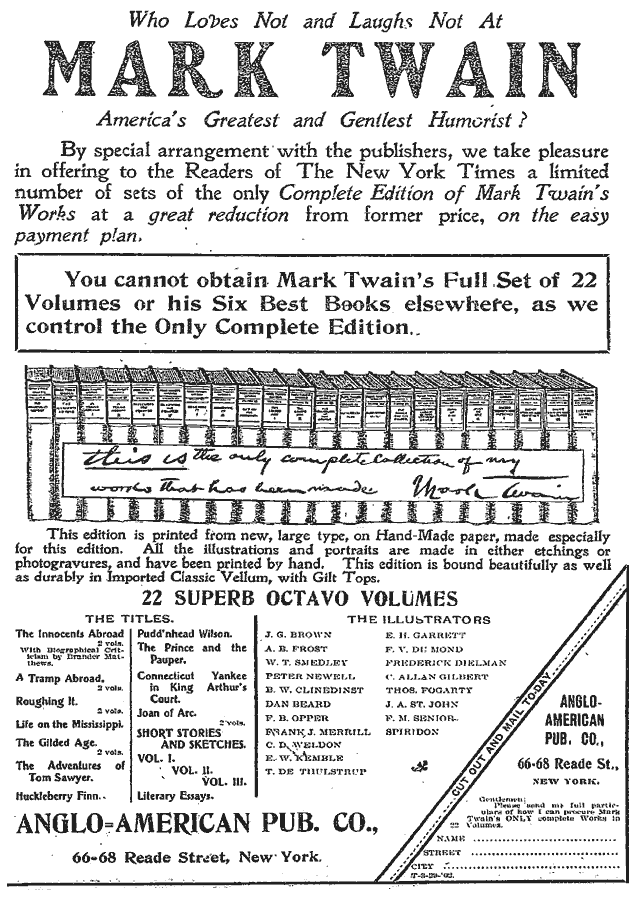
A History of and Guide to
UNIFORM EDITIONS OF MARK TWAIN'S WORKS
"Col. Harvey has gone back on an agreement made with me months ago."
- Samuel Clemens to Henry H. Rogers, 9 July 1901


New York
Times,
January 11, 1902 advertisement by Robert G. Newbegin stating "The only
way to obtain Mark Twain's BEST books is to buy the Complete Set" was
a direct response to Harper's advertising campaign for their Library Edition
advertised in sets of six titles as Mark
Twain's BEST books.
_____
Chapter 5
Advertising Wars (1901-02)
A Subtle War of Words
In October 1901 Harper and Brothers, under the new management
of George Harvey, was issuing two series for several of Mark Twain's titles
in uniform style -- the series with red
cloth binding featuring gold cornstalks around a MT monogram and the Harper's
Library Edition featuring
maroon cloth with a gold and green ornamental flourish on the spine. American
Publishing Company, in an alliance with Robert G. Newbegin, issued two additional
uniform editions of 22 volumes called the Underwood
and Riverdale editions.
Contractual agreements with Harper and Brothers had spelled out how American
Publishing Company would be allowed to use the Harper Mark Twain titles. Newbegin's
name was never mentioned in any of the contracts nor were any restrictions
made on how American Publishing Company would be allowed to distribute the
editions. Tensions between the two publishing houses continued to rise as
advertising campaigns heated up. Ads with Newbegin's name urged book buyers
to purchase complete sets and Harper advertised that they controlled the "best"
titles. A flyleaf bound inside both the Underwood and Riverdale editions issued
in 1901 featured a handwritten statement by Mark Twain stating the American
Publishing Company's edition was the "authorized Uniform Edition of all
my books."

This statement
first appeared in the 1901 Underwood and Riverdale editions issued by American
Publishing Company for Robert G. Newbegin Company.
Newbegin solicited from Clemens a personal letter of endorsement
and evidently complained about Harper's advertising tactics. Clemens replied
to Newbegin on June 1, 1901:
I shall be glad if in offering the Collected Edition of my books to the
public you will claim for it on my part only this and no more: that
I have prepared it with care and that it is the only complete collection
of my books that has been made. Any books which I may yet write will be
added to it.
Very truly yours,
Mark Twain
P. S. I am sorry if your canvassers complain of it as a hardship that
the Harpers advertise 9 of my books under the heading "Mark Twain's
Best Books" but what would they have me do? I think one must concede
that the Harpers are within their rights; for they do not claim that I,
or the public, or the critics, have set the verdict of "best"
upon those 9 books. It is merely their own judgment that the 9 are my
best. I do not quite agree with them, but in a matter of taste every man
is entitled to his own opinion. I rate 6 of their 9 as being among my
best books, but you have the whole of their books in your list,
and in addition you have seven which I rate above any that are in the
Harper list, with the exception of 4, viz., Huckleberry Finn, Yankee at
the Court of King Arthur, The Prince and Pauper, and Personal Recollections
of Joan of Arc.
If you, in the exercise of your own rightful and independent judgment,
should advertise your whole list (of 22 books) as being my "best,"
I should not complain. I should only feel flattered and happy in the
reflection that there was at least one man of better taste than
my own in the world.
Sincerely yours,
MARK TWAIN (The Autograph, p. 70).
Newbegin later used some of the text of the letter in his advertising campaigns
to sell the edition.
Mr. Underwood's Request
Clemens was spending time at Lake Saranac, New York in the summer
of 1901 and still relying on Henry Rogers's financial advice. On July 9, 1901
he wrote Rogers:
Blliss's check for the past half-year is just received -- nearly $6,000.
Eight or nine thousand still owing, but not due yet, because it isn't yet
due from Newbegin (Leary, p. 465).
According to inflation calculations, that amount would be equal to over $140,000
in year 2007. Clemens was receiving 12 1/2 percent royalties on his single
editions as well as the uniform edition being published by the American Publishing
Company. Clemens continued in his letter to Rogers:
Newbegin's backer, Mr. Underwood, has asked me to give a circular letter
for canvassers' use, to modify Harper's big advertisement of "Mark
Twain's Best Books," and I feel pretty willing, for in using that heading
Col. Harvey has gone back on an agreement made with me months ago. He was
going to use a heading "Mark Twain's Choicest Books," and I protested.
If you approve the circular, please mail it to Mr. Underwood, for he is
uneasy; and the Newbegin business is large, the Harpers' trifling. Their
July statement for past 6 months foots up $2000 -- and I get it next November
(Leary, p. 465).
While the payments from Harper and Brothers were lagging behind the amounts
Clemens was receiving from American Publishing Company almost three to one,
Harper was struggling to market six "Best" books rather than the
expensive sets of 22 volumes. Clemens remained hesitant to get involved in
favoring one publisher's advertising campaign over the other -- after all,
he had a contract with Harper and Brothers for his new material, including
magazine contributions, in effect until January 1902. A few days later on
July 13, 1901 he wrote to Frank Bliss:
[T]he Harpers don't say I call theirs the latest and best -- they
say it themselves. Therefore why doesn't Newbegin say the very same thing?
Harper has set the example, and could not complain (Leary, p. 466).
It is likely that Rogers passed along Clemens's letter to Mr. F. L. Underwood
-- Frank Livingston Underwood. It is even more likely that Underwood and Rogers
had known each other through their past business dealings. Underwood was the
first president of Arizona Copper Company. At the time of his death at age
73 in 1915, he was President of the British Columbia Copper Company. He and
Rogers were two of the original organizers behind the American Smelting and
Refining Company. Underwood had started his career as a bank clerk in Muscatine,
Iowa, organized the Merchants' National Bank of Kansas City, Missouri and
been involved in building Western railroads. How Underwood came to be involved
in backing Newbegin's Underwood edition -- an edition which bore his name
-- is an unanswered question. It seems likely that Rogers could have steered
Underwood into such an investment and even more likely that Rogers himself
may have been involved in quietly assisting Clemens in other financial ways
as well.
Not only was Newbegin soliciting endorsements from Clemens, he was also offering
"free of cost, six of Mark Twain's Best Books" in exchange for endorsements
from "representative men" for his own Complete Uniform Edition.
One such solicitation from Newbegin dated October 1, 1901 to businessman Bloomfield
Brower stated that Newbegin was soon to issue the "Complete Uniform Edition"
of Mark Twain's works and he would treat any endorsements in exchange for
six of "Mark Twain's Best Books" as confidential. (Newbegin to Brower,
October 1, 1901, MTP). Apparently Newbegin was giving away Harper's set of
six titles as small bargaining chips to obtaining advertising puffs for his
own editions of 22 volumes.
In spite of the endorsements Clemens personally wrote for Newbegin and Underwood
it was only a matter of time before phony letters with Clemens's signature
surfaced asking buyers to buy his books.
Cold-blooded Rascality
On September 18, 1901 Clemens wrote Henry Rogers that he had
just found out about phony letters with his forged signature soliciting sales.
There were likely hundred of such letters sent to people across the country
bearing a return address "S. L. Clemens, U.S.A." and some of them
had indeed been returned to Clemens. The letters contained a personal appeal
from Clemens for books sales. Such an idea was abhorrent to him. He wrote:
This is a mighty cold-blooded piece of rascality. The Newbegin Co wanted
me to give them something just about like this, (they applied first through
Bliss and he brought me the draft of it) but of course I didn't consent.
But I sent them something through you (which you approved) and never got
even a thank-you. I didn't suit, I guess.
So now they resort to plain forgery. They forge my signature, and then
they put into my mouth a shameless personal letter no word of which ever
had its source in either my mouth or my head, and then they add sacrilege
to impudence and counterfeit my style!
Now then, am I not right? Sue these rascals at once (Leary, p. 472).
Attorney Thomas B. Reed, a close friend of both Henry Rogers and Clemens
initiated the case. Robert Newbegin was confronted with the fraud and laid
the blame on another book dealer. Newbegin explained to Clemens in a letter
of October 7, 1901 that he had sold 500 sets of "the Popular
edition" to W. I. Squire (Washington Irving Squire - b. 25 Oct. 1844),
a book dealer in Chicago. Newbegin blamed Squire for printing and mailing
out the letters featuring a fraudulent signature. Newbegin claimed he had
informed Squire that his firm would not be a party to such sales tactics and
he felt the practice had been discontinued. The suit against Squire was dropped,
however, when Squire died two days later on October 9, 1901 in Toledo, Ohio.
Newbegin Continues His Campaign
On November 19, 1901 Newbegin ran the following ad which covered
four columns in the New York Sun.

New York Sun, November 17, 1901, p. 7.
Newbegin's ad reprinted the handwritten letter Clemens had sent
him that summer. The ad also acknowledged that four-fifths of the uniform
edition sets had been sold by private subscription but his offer was a departure
from that plan. The ad did not specify which edition Newbegin was selling
directly to the public.
On December 21, 1901 Clemens wrote Rogers:
"Wally" Bliss was here yesterday, and I guess there are going
to be some developments. I have kept out of the Harpers-Newbegin fight up
till now, but I believe the time has come to take a side in it. So I will
drop in on you and get your advice before I do anything in the matter (Leary,
p. 478).
One of the last newspaper ads from Newbegin appeared in the New York Times
on March 29, 1902 under the name of his new partnership with Anglo-American
Publishing Company.

New York
Times,
March 29, 1902, p. BR19.
The Anglo-American Publishing Company was incorporated in New
York in October 1901 with $100,000 capital. Directors of the company were
listed by the New York Times on October 30, 1901 as Guy Stonestreet,
Robert F. Stonestreet and Herbert Schubert. For a short while Anglo-American
Publishing Company also published a periodical called Anglo-American Magazine.
The July 1902 edition featured an ad for Mark Twain's uniform editions with
instructions to customers to contact the company for further details.
The inventory of uniform editions distributed by Newbegin appears
to have been depleted after the summer of 1902 as evidence of further advertising
campaigns is lacking. However, the tensions created by the sales competitions
between publishers and distributors helped set the stage for Henry Rogers
to negotiate a settlement that would concentrate all rights to Mark Twain's
works in the hands of only one publisher.
_____
References
Ancestry.com
- for biographical information on Washington Irving Squire.
"Barton
Sewell Dies. President of Copper Co. Succumbs After Long Illness, Aged 67."
New York Times, 8 January 1915, p. 11.
"Frank
L. Underwood Dies." New York Times, March 18, 1918, p. 13.
Leary,
Lewis, ed. Mark Twain's Correspondence with Henry Huttleston Rogers 1893-1909.
(University of California Press, 1969).
"Mark
Twain's 'Best Books,'" The Autograph, March-April 1912, p. 70.
Online via google books.
Newbegin,
Robert G. to Bloomfield Brower, 1 October 1901. MTP.
Newbegin,
Robert G. to Samuel Clemens, 7 October 1901. MTP.
"New
York Incorporations," New York Times, 30 October 1901, p. 13.

![]()




